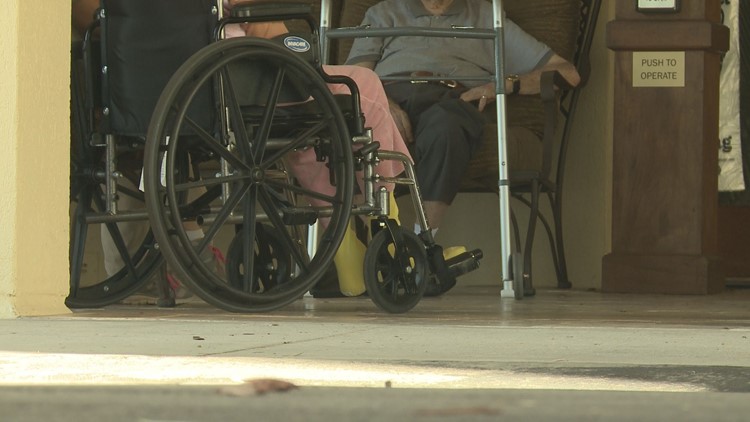It was one of the saddest stories to come out of Hurricane Irma.
14 seniors died in a South Florida nursing home, after being left without power in sweltering conditions.
The tragedy prompted a change in the form of a new law.
Now, all senior facilities are required to have back-up power for at least 96 hours.
But according to a database put together by the Agency for Healthcare Administration, more than half of the nursing homes in the state do not yet have the emergency power plan implemented.
Many have asked for an extension which allows them until January 1st to put their plan in place that would keep facilities cooler than 81 degrees if the power were to go out.
With Hurricane Michael likely to affect parts of Hernando and Citrus County, we took a closer look at their facilities.
Out of more than 60 facilities, half of them have asked for an extension.
The agency for health care administration-- or A-H-C-A, says most of the facilities asked for an extension to comply with the new law. That means they had to at least show they had a plan.
In some cases, facilities were delayed by construction or other factors.
But those facilities also needed to show proof of a backup plan, to move residents or bring in generators at the last minute if they lose power.
If you want to check whether or not your facility or loved one's facility has a power plan in place, click here.
Statements from the Agency for Health Care Administration regarding facilities Emergency Power plan:
"While extensions are allowable under the rule, before one is approved by AHCA, the facility must provide a detailed explanation of how they will ensure patient protection during the extension timeframe. There are a variety of reasons a facility could request an extension, for example, if they are waiting on the local emergency management officials to approve their plan, or if they are waiting on permits for construction or zoning. Extension details include how patient temperatures will remain safe during loss of power, such as how the facility will be cooled and evacuation plans if needed."
Please see the below statements from Secretary Justin Senior:
“Florida has some of the strictest standards, if not the most strict standards with regards to emergency power in the nation. We are fully committed to holding our facilities accountable to these high standards. We recognize that this is an aggressive timeline for implementation, and our Agency has seen a lot of progress from the facilities in working to implement these emergency rules. Not only are facilities working to come into compliance, but in many cases, they have gone above what the rule requires with regard to cooling the facility, and many facilities are working to install generators that would cool the entire facility.”
“We really appreciate and encourage this comprehensive approach. The changes that we see the facilities implementing are not generally temporary solutions, but are long-term improvements that will provide a safer environment with regards to temperatures for residents. These are lasting improvements, which will allow emergency operations officials to use a more targeted approach in the aftermath of storms and other periods of prolonged power outage.”
“In some cases, these are long-term projects that require permitting, zoning and construction. And pursuant to Florida law, a private business may seek a variance from any rule, given the business meets stringent requirements. Before our Agency grants any variances, we need to see that the facility has made great strides to come into compliance and that any delay is out of their control. The rules have been in effect for months now, and a facility that has procrastinated is unlikely to meet the state’s strict variance standards. Any facility that has a delay in implementation will need to submit evidence that shows they are well underway in their project before they are granted a variance. If a facility is not following the law, we will aggressively issue fines. In fact, we’ve already begun the process of fining certain facilities. Again, we will stop at nothing to ensure these facilities are appropriately protecting Florida patients.”
►Make it easy to keep up-to-date with more stories like this. Download the 10 News app now.
Have a news tip? Email tips@wtsp.com, visit our Facebook page or Twitter feed.



